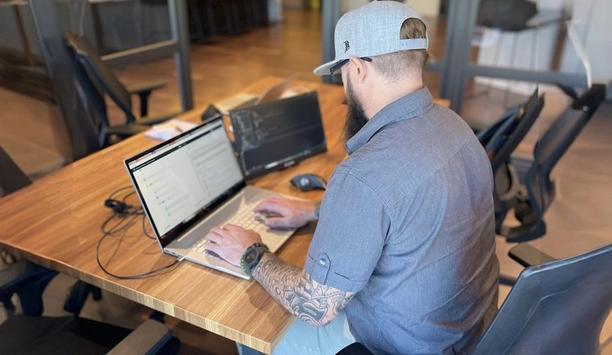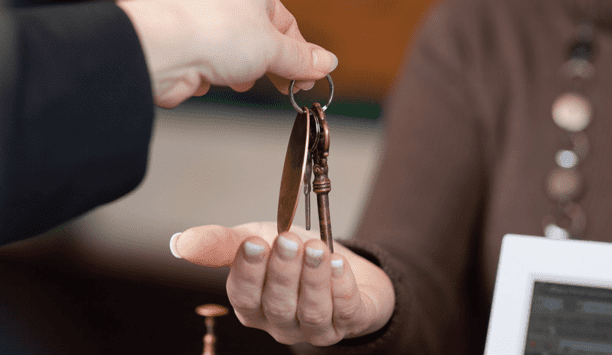 |
| MOBOTIX cameras have been installed at the Hochspeyer final clarifier and at the main entrance |
Low costs long-term
What can communities do to avoid increasing costs of public services? As most communities are struggling to maintain balanced budgets, this is not an easy question to answer. And yet, there are promising concepts and solutions. Consider the WVE (Westpfälzische Ver- und Entsorgungs-GmbH) that has been founded in the Kaiserslautern area in 1994 as a public services company. The WVE provides fresh water, sewage treatment and zoning/development services for the communities in the area. The communities, in turn, are able to efficiently outsource expensive tasks. “Our efforts are based on economic and entrepreneurial thinking”, is a quote from the mission statement of the WVE, a subsidiary of the Kaiserslautern technical services company TWK (Technische Werke Kaiserslautern AG) in Germany. As a result, other communities benefit from market-oriented pricing, high quality, efficiency and flexibility. As these communities and cities pay only for services that they actually use, they can minimise their HR-related and other fixed costs.
Example: sewage plant
The WVE is able to provide all required services regarding the sewage plant operation at short notice. For tasks like these, the WVE uses its own employees, its special equipment and equipment of other communities. In the process, the WVE cooperates closely with the Kaiserslautern city waterworks and the TWK. These WVE services are particularly attractive for the small surrounding towns and communities that have a strong interest in reducing their costs. One of these small towns is Hochspeyer – about 7 miles east of Kaiserslautern – with its approximately 7,000 inhabitants.
Always on the ready
The three sewage plants of the Hochspeyer community are located in Hochspeyer, Frankenstein and Waldleiningen. Three WVE employees operate and maintain all three plants locally. Since an on-site 24/7 presence would be too costly, an electronic monitoring system reports possible malfunctions occurring after work hours to the permanently manned control center at the Kaiserslautern central sewage plant. Here, the necessary measures are taken. Because the government requires the installation be checked once a day, the WVE employees have to perform these on-site checks even during the weekends.
Weekend problems
WVE wastewater manager Michael Theis describes the situation as follows, “these weekend shifts cause our work plans to be quite complicated and are also creating extra costs for the community, as an on-site check at all three locations amounts to around 250 EUR. Additionally, driving to the individual locations on ice and snow in the winter time can be quite dangerous – just to check the sewage plant for 15 to 30 minutes. This prompted us to look for an alternative”, Michael Theis adds.
A network camera is the key
Dieter Burkey, electrics manager with the Kaiserslautern city waterworks states, “at about the same time, we were testing a MOBOTIX network camera for monitoring the security of our central sewage plant.” Michael Theis adds, “next, we started wondering if this camera could solve our weekend problem as well.” Indeed, it could. Not only is this reliable and weatherproof camera equipped with a large number of required features, but it is also easily operated using a standard Internet browser. In close cooperation, MOBOTIX and the WVE have developed some additional features that were necessary for operating at the sewage plant. “The result is a customised solution that completely meets our requirements,” concludes Michael Theis.
24/7 surveillance
"In close cooperation, MOBOTIX and the WVE have developed some additional features that were necessary for operating at the sewage plant" |
With minimum effort, the camera has been installed at the Hochspeyer final clarifier for a pilot project. From there, it sends a tele and a wide-angle image twice a day via ISDN to a server. In the control center at the Kaiserslautern central sewage plant 7 miles away, the operator on duty compares the current live images to the stored images of the target situation. If the images show signs of abnormal operation, the operator on duty immediately informs the emergency crew.
Secure operation
A second MOBOTIX camera installed at the main entrance reports any cases of unauthorised access. On weekends, this camera is switched to event control. Once it detects unusual movement in the image window, the camera immediately sends an alarm email to the control centre. As an alternative, the control centre could also be notified through an automatic, PIN-protected phone call. If desired, the live images can be viewed from the control center at any time to check the plant’s current status. Also, a process control system provides for regular measurements of the PH value. Thus, regular checks are now implemented remotely, resulting in even more secure sewage plant operation.
An investment worthwhile
Thanks to the introduction of camera remote monitoring at the Hochspeyer facility, the expensive weekend shifts are history and the use of on-site manpower has been optimised. Soon the two other locations will also be equipped with MOBOTIX cameras. “The MOBOTIX camera comes with all required features,” Dieter Burkey summarises. “A very reliable, high-quality support and a reasonable price for what you get – we are very satisfied with the entire package,” he adds. Michael Theis sees another service feature in the cameras. “Other sewage plants can use this inexpensive remote control service as well,” he points out. “We can provide the entire range of services – from planning and starting the official approval process via installing and maintaining the cameras to 24/7 monitoring. And this means less problems for the communities,” Michael Theis concludes.

















